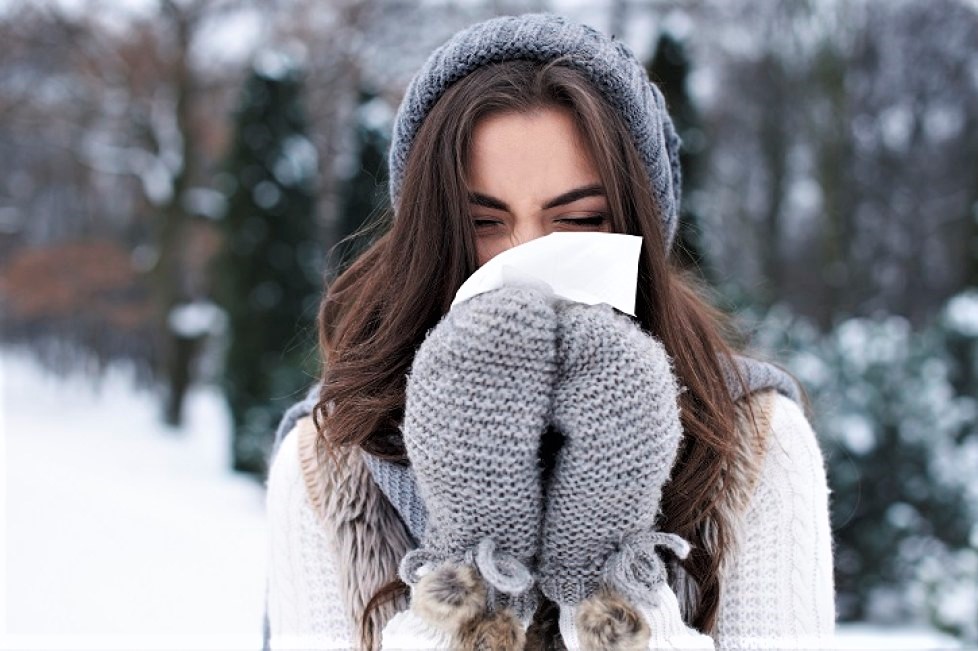Almost everyone prefers summers over winters. While the warmth of the sun is the biggest reason for this, winter illness also plays a huge role. Various health conditions are triggered or worsened by the cold weather. Here’s how to deal with 10 common winter illnesses.
1) Colds
Prevention of cold is very simple, that is by washing your hands regularly. This destroys bacteria and bugs which you might have picked up while touching surfaces used by other people, for instance light switches and door handles.
It is extremely important to keep the house and any household items such as cups, glasses and towels clean, especially if someone in your house has been sick.
When you catch a cold, use disposable tissues rather than fabric handkerchiefs to avoid constantly infecting yourself again and again.
2) Sore throat
Sore throats are quite common in winters and are mostly caused by viral infections.
There’s evidence that fluctuations in temperature, like going from a warm, centrally heated room to the icy outdoors, can greatly affect the throat.
Dr Aamerah Shah, a primary care specialist at the American Hospital Dubai says, “extreme and sudden variance between outside and inside temperatures has adverse effect on body as it undergoes a certain amount of stress when it is forced to go from a boiling hot environment into an air-conditioned one”.
A quick and easy remedy for a sore throat is to gargle with warm water either salty or mixed with a spoon of honey. This won’t heal the infection, but honey and salt have anti-inflammatory properties which can have a soothing effect.
3) Asthma
People with asthma should be alert and careful during winters since cold air is a major trigger of asthma symptoms like wheezing or shortness of breath.
Such individuals should stay indoors during cold, windy days. If they do go out, they should wear a scarf loosely over their nose and mouth.
Also make sure you’re extra vigilant about taking your regular medications, and keep your reliever inhalers close by.
4) Norovirus
This is the most common winter illness. Norovirus is also known as the winter vomiting bug. It is an extremely infectious stomach bug which strikes all year round, but becomes more common in winter specially in public places for example hotels, hospitals, nursing homes and schools.
Although the winter sickness is pretty unpleasant, but it doesn’t last more than a few days.
When people are sick with vomiting and diarrhoea, it’s recommended to drink plenty of fluids to prevent dehydration. By drinking oral rehydration solutions (ORS) available at pharmacies, risk of dehydration can be reduced and even cured to a certain level.
5) Painful joints
You must have probably heard individuals with arthritis complaining that their joints become more painful and stiff in winter even though there is no evidence that colder climates cause joint damage.
Many people get a little depressed during the winter months due to the winter blues or seasonal affective disorder which might make them perceive pain more acutely.
When depressed, everything feels worse, specially medical conditions. Daily exercise and physical activity can boost a person’s mental and physical state while more intake of calcium and other nutrients can help prevent joint and bone pain.
6) Cold sores
The most common reason for cold sores is exhaustion or stress. While there’s no specific cure for cold sores, we can reduce the chances of getting one by looking after ourselves through winter.
Try and do things which make you feel relaxed and less stressed, for example taking a hot bath, going for a walk in the park, or watching one of your favourite movies or simply sleeping as much as you want.
7) Heart attacks
According to a study published in PLOS One in 2015, heart attacks are most common in winter. They found up to a 31 percent increase in heart attacks in the coldest months of the year compared with the warmest.
This is because cold weather increases blood pressure and raises cholesterol levels which are the two key risk factors for heart attack which can make blood more likely to form heart-threatening clots.
To avoid the risk of heart attack, stay warm within your house or wherever you go. Heat the rooms to atleast 18°C and use a hot water bottle or an electric blanket to keep your bed warm. When going out, wrap yourself up warm and make sure you wear a hat, scarf and even gloves.
8) Cold hands and feet
Raynaud’s phenomenon is a condition which makes your fingers and toes change color and become painful in winters. Fingers go from white to blue to red, while throbbing and tingling.
The small blood vessels in hands and feet spasm which temporarily reduces blood flow to the areas.
DONOT smoke or drink caffeine if you experience this and always keep yourself warm before going out in cold temperature.
9) Dry skin
When environmental humidity is low skin tends to dry out which is why moisturizing is essential during winter. Moisturizing lotions and creams don’t just get absorbed by the skin, they act as a protective layer to stop the skin’s natural moisture from evaporating..
Apply moisturizer after a bath when your skin is still moist or at bedtime. Too hot water makes skin feel more dry and itchy so always have warm showers.
10) Flu
Flu is the most common winter illness. It is a viral condition which mostly affects people aged 65 and over, pregnant women and people with long-term health conditions, like diabetes, kidney or chronic obstructive pulmonary disease (COPD).
The best way of preventing flu is to have the flu nasal spray for children aged 2 to 17 also called a flu jab. The flu vaccine also gives protection against flu and lasts for a year.
People over 65 or with long term health conditions and diseases are also eligible for the pneumococcal vaccine that provides protection against pneumonia.
















